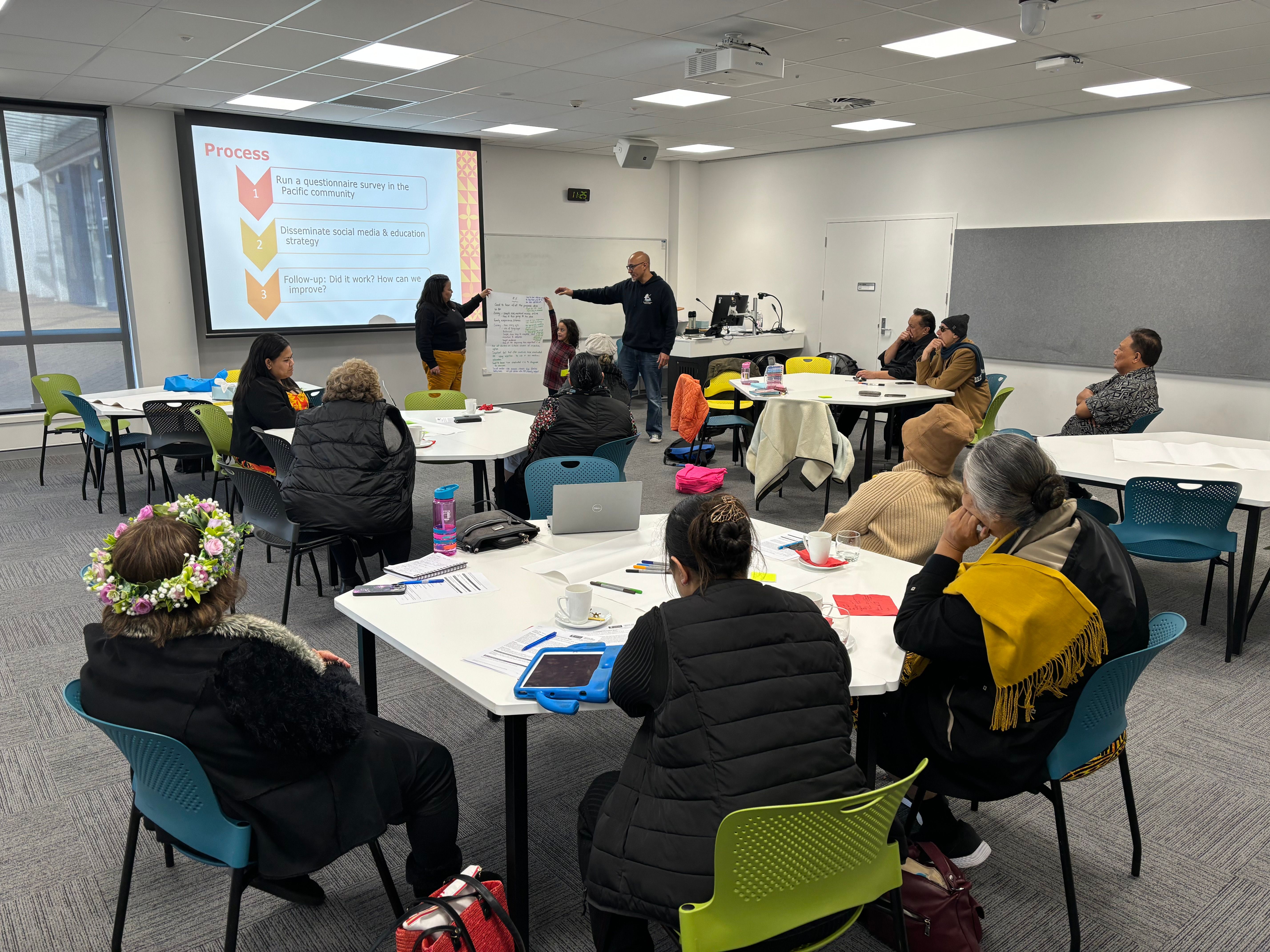

UoA research fellows Dr Siobhan Tu’akoi (left) and Dr Samuela 'Ofanoa (right) / Photo: Siobvhan Tu'akoi
Pacific researchers driving community-led health interventions
Young academics Dr Siobhan Tu’akoi and Dr Samuela 'Ofanoa partner with Pacific groups to improve healthcare inequities for Māori and Pacific people.



Tongan royals to celebrate age-old ties with Fiji at high chief’s installation ceremony

From reef ruins to science inspiration: Marine mission in Tuvalu concludes

Young, proud, and ‘ready to roll’: Sāmoa women pursue glory


Pacific-Māori marriages lead new identity wave

Tongan royals to celebrate age-old ties with Fiji at high chief’s installation ceremony

From reef ruins to science inspiration: Marine mission in Tuvalu concludes

Young, proud, and ‘ready to roll’: Sāmoa women pursue glory
Access to quality healthcare and healthy living conditions is crucial but many Māori and Pacific communities in Aotearoa face significant challenges.
Contributing factors include high living costs, outdated housing without insulation, and limited awareness and education.
Two young Tongan researchers from the University of Auckland (UoA) have teamed up with Pacific People’s Health Advisory Group and Pacific People’s Practice-Based Research Network to tackle these issues.
Postdoctoral research fellow Dr Siobhan Tu’akoi, born and raised in Hamilton, hails from Holonga, Tongatapu with European ancestry. She is 29 years old.
36-year-old Dr. Samuela 'Ofanoa was born and raised in Tonga in the villages of Felemea, Ha’apai, and Vaimalo Vava’u.
The young researchers were funded by the Health Research Council, and are addressing major health issues such as gout and rheumatic fever that are impacting South Auckland communities.
Tu’akoi focuses on addressing rheumatic fever inequities while 'Ofanoa works on improving understanding of gout and urate-lowering therapy.
Both have implemented co-designed interventions for their research.
“This whole process is community-led. So it's something that is quite different from the traditional structures of governments and ministries kind of imposing these different interventions, but actually going back to our communities who are living these experiences every day and seeing what they think is going to make a difference.
'Ofanoa says gout and rheumatic fever are major health issues recognised as prevalent yet underserved among Pacific families.
Tu’akoi says Pacific children are 80 times more likely to be hospitalised for rheumatic fever and Māori children 36 times more likely than non-Māori, non-Pacific children.

Pacific research workshop on rheumatic fever at UoA South Auckland Campus in Manukau
“What we're seeing with rheumatic fever is that there's been a lot of funding in the past towards rheumatic fever, particularly for Pacific people, but we're still seeing high rates,” Tu’akoi says.
'Ofanoa says there’s a 10 per cent difference between Māori and Pacific people getting gout compared to non-Māori, non-Pacific people.
“The prevalence is quite high for our Pacific people. We have about 14 per cent versus non-Māaori, non-Pacific, which is about four per cent…Māori within that is nine per cent.
“The inequities are we're [Māori and Pacific people] more likely to get gout recurrently. We're more likely to be hospitalised from gout, and to which can impact our quality of life as well…and our ability to support our families and work,” 'Ofanoa says.
The academic research team also includes Auckland University Senior Lecturer Dr Malakai 'Ofanoa and General Practitioner Dr Hinamaha Lutui.
Lutui points out that New Zealand’s aging housing stock affects living conditions, contributing to health problems.
“Properly insulated and ventilated homes reduce the incidence of illnesses, including rheumatic fever.”
Lutui is concerned about the government’s approach to healthcare, saying equality does not equate to equity. Targeted support is needed for affected communities.
“This government's all about equality, not equity. So if we're all the same, that means actually we're gonna get less…because there's no equity…that's the worry.
“We're mainly targeting, for some reason, the disease burden is mainly Pacific and Māori, but if we're saying that we can't actually direct funding to help prevent that from occurring, then what little they have now is probably, is it gonna be even less…and is this gonna get even worse in the future because of that. I guess that is a little bit of a worry, to be honest,” Lutui says.
'Ofanoa says our communities are always there at key decision-making phases of the project because it's co-designed. “And we're just alongside them supporting how they develop a lot of our phases.”
The project began in 2016 when Samoan teacher Rose Lamont was inspired by a conference in the United States on community-engaged research, Tu’akoi said.
The research team has been hosting workshops with the Pacific groups to ensure the project remains community-led.
The first rheumatic fever workshop was held last Saturday at Auckland University's South Campus.
'Ofanoa said delivering long-term outcomes for Pacific communities was central to the project.